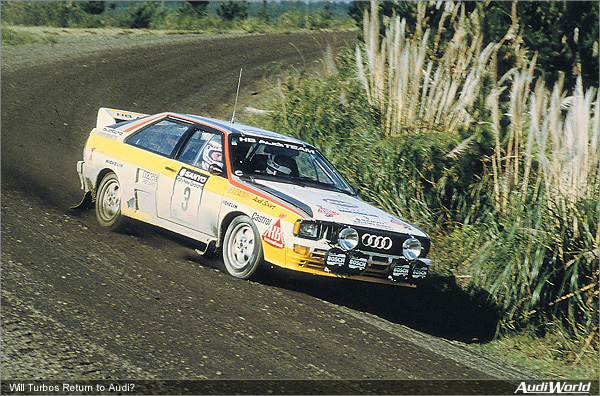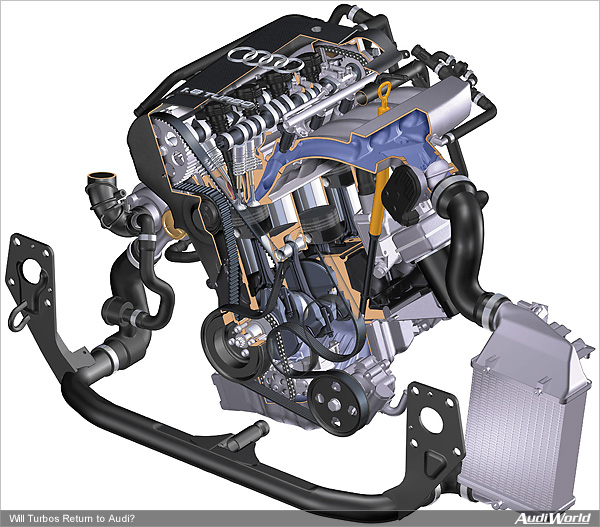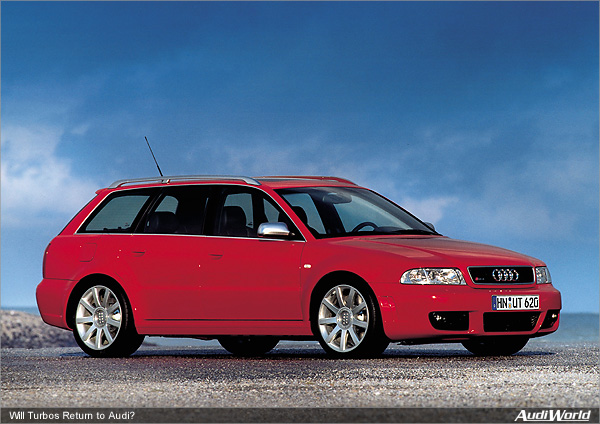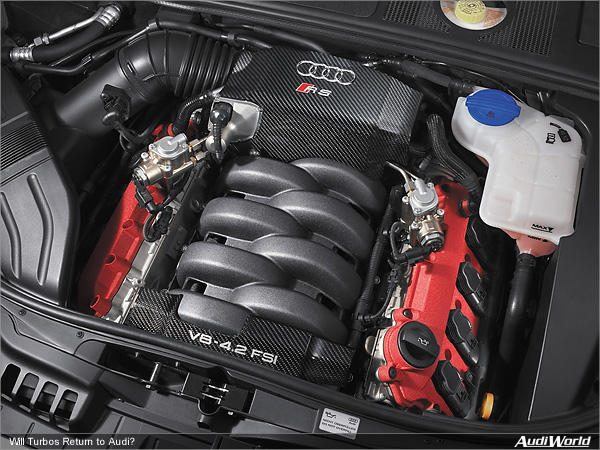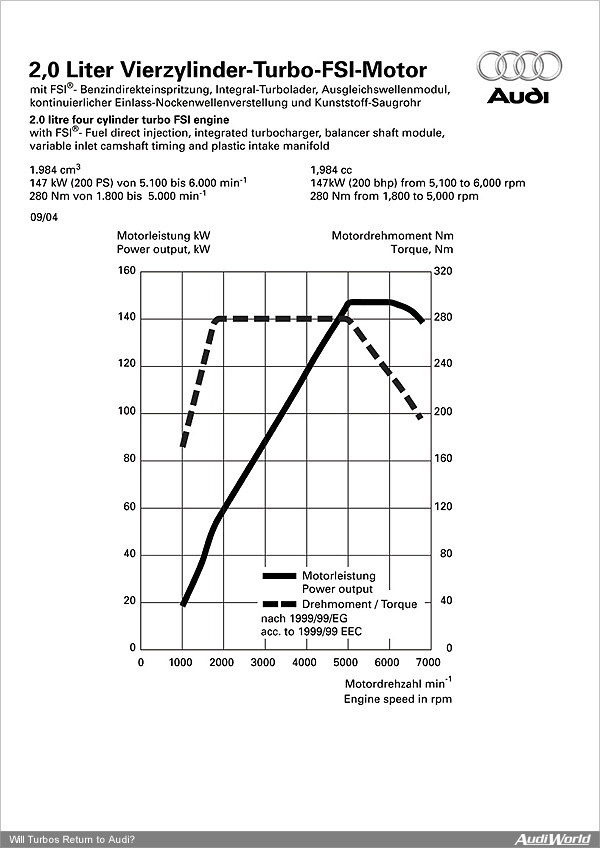Will Turbos Return to Audi?
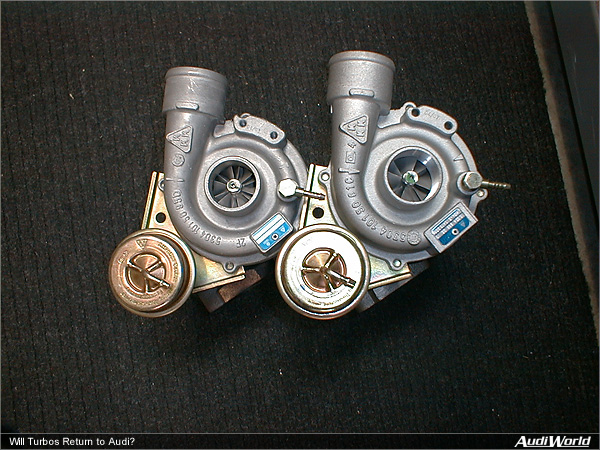
Audi knows a thing or two about using turbochargers in high performance street and race applications. The rise of Audis legendary motorsports reputation in the 1980s came almost entirely from a very potent and robust turbocharged inline 5 cylinder engine (2.1 or 2.2 liters depending on year). With this platform, Audi dominated the Group B Rally ranks and the American Trans-Am racing series. The advantage provided by the unbeatably-turbocharged, fire breathing, I-5/quattro-driven Audi was so great that it eventually led to the ban of all wheel drive cars within the series. On the high banks of Talladega, Audi set a world record by running a 600+ horsepower quattro 200 sedan to an average speed of nearly 207 mph – a first for an all wheel drive equipped passenger vehicle. Audi used the knowledge and know-how gained campaigning this driveline and applied it directly to its passenger cars. The four rings brand subsequently offered numerous variations of the championship-proven, turbocharged inline 5-cylinder mill in its lineup throughout the 1980s and early 90s.
Audis turbocharging innovation didnt skip a beat in the 1990s. Audi next went on to introduce the 1.8-liter turbocharged inline 4-cylinder engine (affectionately known as the 1.8T) in the B5 A4 platform. This groundbreaking motor would later become one of the best selling and affordable turbocharged gasoline motors of all time. Packing five valves per cylinder, slick Motronic torque oriented engine management (more on this feature later), and a small K03 turbo nearly devoid of turbo-lag, this engine showed the world that 6-cylinder performance could be achieved with 4-cylinder fuel consumption and space constraints. The 1.8T is also recognized as the first turbocharged gasoline engine to meet stringent ULEV (Ultra-low emission vehicle) standards.
After bringing a truly affordable turbocharged engine to the masses and winning Wards 10 best engine award twice (1997, 1998), Audi decided to breathe a little fire into their performance lineup using not one, but TWO turbochargers mounted in parallel (biturbo) to a high performance 2.7 liter V-6. The B5 S4 debuted in Europe in 1998 sporting the same design features (five valve heads, torque oriented Motronic engine management) which had made the 1.8T so impressive and effective. The 2.7T turned in very solid numbers: 265 horsepower @ 5800 RPM. More impressive was the torque curve; the 2.7 cranked out 295 ft-lbs in a flat plateau between 1850 and 3600 RPM. This type of torque at such a low RPM was unheard of from only 2671 cc of displacement. The 2.7 biturbo was also decorated as it made Wards 10 best engine list in 2000 and 2001. Consulting with the experts at Cosworth Technology allowed Audi to take the 2.7 concept even further in order to power its ultimate performance Avant, the B5 RS4. Boasting the highest specific output ever for a production engine of the time (142 hp/liter) due to breathing upgrades over the S4s biturbo V-6, the 380 horsepower RS4 powerplant was on the cutting edge of performance and technology. The engine in RS4 trim has proven to be very reliable and capable in both street and racing configurations. Even to this day, few engines can match the specific power or power density (380 hp from less than 440 lbs engine weight).
Soon thereafter, the biturbo concept was adapted to the corporate aluminum 4.2-liter V-8 to power the ultimate luxury Autobahn cruiser: the 450 horsepower RS6. At the end of the 90s and well into 2000 and beyond, Audi experienced considerable motorsport success in endurance racing. Powered by innovative turbocharged technology in arguably one of the most successful racing platforms of all time, the biturbo FSI R8 has become synonymous with power and reliability. The R8s unbeatable combination of biturbo torque and FSI power/fuel consumption was a huge factor in Audis unprecedented success at Le Mans. Recall Audi took home five overall wins in six years. Fast forwarding to 2006, Audi has only one gasoline turbocharged engine remaining in its lineup. Although its not offered in the performance S/RS range, it is still a very innovative and cutting edge design in typical Audi fashion. The 2.0T is recognized as the first production gasoline engine to incorporate both direct fuel injection technology (FSI) and an exhaust driven turbocharger. In a basic sense, this is the same idea which powered Audi to Le Mans victory five times. For the driver this translates into an engine similar in character to the 1.8T but better in every sense. On the other hand, Audis current performance lineup has seemingly shifted away from turbocharging technology. Todays S and RS lineup is entirely made-up of Hochdrehzahl Konzept, or high-rev concept engines. Audi has shifted its focus away from medium revving turbo engines with plateau like torque curves. The current S8, S6, S4, and RS4 V-10 and V-8 engines all share relatively low torque numbers given their horsepower specification and the driving experience is accordingly much different compared to the turbo motors of yore. Many find the normally aspirated experience to be more pure. Some say Audi has gone this route in order to appeal more to the typical BMW driver, as BMW has designed high revving/low torque engines for decades. Others say Audi is showing that it is capable of producing high revving normally aspirated motors simply because it can. In any case, the new design direction has proven successful. The Lamborghini derived V-10 found in the S8/S6 cars emits a howl which is unheard of in such a luxury sedan and has all the performance required to back it up. The RS4 is gathering great press for its jewel of a V-8 which revs to an astonishing 8,250 RPM.
Given the current Audi powerplants we must ask the question – are performance-turbocharged engines on their way out? Will Audi and the VAG group shift its focus entirely to normally aspirated/high revving engines? In our opinion, no. We have a very strong feeling that within due time, turbocharged FSI engines will be returning to the performance ranks of Audi and other the VAG brands. In order to stay competitive in the ongoing European horsepower wars with the current engine platforms, Audi will have to bring back the almighty turbo. Audi has reached the peak performance potential of their current V-8 and V-10 platforms. The V-10s in the S8/S6 cars and the V-8s in the S4/RS4 cars all share the same stroke of 92.8 millimeters. The engine stroke dimension (how far the piston moves up and down) coupled with the RPM dictate the average speed of the piston. The B7 RS4s engine at 8250 RPM has an average piston speed of 25.52 meters per second. This is faster than ANY current production automobile engine out there and on par with Formula 1 race engines. Current technology does not allow a reliable piston speed faster than this. Make no mistake, this trivia is important. In order to get more horsepower from an engine, air intake must be increased. There are really only three basic ways to accomplish this task. The manufacturer could increase the peak RPM while developing a valvetrain that can breathe and keep up, however Audi doesnt have this option. An increase in RPM would require a reduction in stroke to maintain reliability. A stroke reduction is guaranteed to reduce the torque response of the engine. Audi cannot afford to reduce the torque; in fact, the next generation engines will need much more torque to stay competitive. Another possibility would be to increase the engines displacement for more power, but this will create weight and packaging problems as the engine sits entirely in front of the front axle on quattro equipped cars. The engine capacity in Audi V-10 variants has already been increased to the limits. The final potential option is to force more air into the engine. Luckily Audi knows how to do this, and they do it quite well. Re-introducing turbocharged engines into the lineup offers many advantages for Audi. When coupled with FSI direct injection, a much higher compression ratio can be used than with indirect injection due to cooling effects of the fuel spray. This reduces turbo lag and increases overall efficiency. Also, modern engine control is capable of providing a plateau flat torque curve when torque oriented programming is utilized. This is Audis term for manipulating the turbocharger output with a sensor-based feedback system to calculate and regulate the engines power characteristic. This is a feature which cannot be mimicked with normally aspirated engines. Examining the torque curves of the 1.8T, 2.7T, 2.0T, and 4.2T engines, it is very clear that the peak torque occurs very early and is held flat throughout a large portion of the rev range. This technology also allows the engine to maintain a consistent power level almost irregardless of atmospheric conditions and elevation.
Other new turbocharging technologies can improve the torque characteristic and reduce turbo lag even further. The 997 Porsche 911 turbo is the first gasoline turbocharged engine available with Variable Turbine Geometry boost regulation which promises better throttle and torque response. It is certainly within Audis ability to create an engine which offers both the high-revving concept and the brutal low end torque and response of a modern direct injected turbo powerplant. Modern advances in catalytic converters also assist turbocharged engines in meeting new and ever-more-strict emission standards. So whats next up for Audi? We have yet to get any official word on the upcoming RS6. That said, a promising speculation would be that a biturbo version of the S6/S8 V-10 would be an excellent candidate to power a vehicle like the next generation RS6. Audi is testing biturbo variants of the V-10 and the platform has proven itself capable of well over 600 hp with a monster torque curve to match.. Moving next to the R8, the top level road car could easily be turned into a world-beater with such a beast residing within the engine compartment. With the competition closing in on the Lamborghini cars in terms of horsepower, a slightly de-stroked, boosted, and high revving V-10 or V-12 powerplant is certainly within the realm of possibility. Lastly, BMW has announced that a biturbo direct injection version of its 3.0 liter inline 6-cylinder has been announced for the coupe version of the 335i. Mercedes AMG is rumored to be developing a direct injection biturbo motor of its own. Audi will need to revamp its entire engine platform strategy or add some boost to keep up with the competition. Our money is on the latter option. The esteemed turbo guru Corky Bell has been quoted as saying, turbos make torque, and torque makes fun. We personally feel hes right, and hope Audi feels the same way. Only time will tell, but one thing is for sure: its a great time to be a horsepower hungry enthusiast for European cars! |

